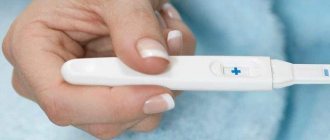Most women know that every month, around the middle of the cycle, there are days when conception is most likely. Some are waiting for them with caution, others with hope. Most women are sure that if their periods come on time, there is no delay, which means there is no pregnancy.
Someone sighs with relief and puts a new mark on the calendar for the beginning of the next cycle. Someone, on the contrary, is upset because the desired pregnancy did not happen. But in nature, events do not always develop the way you are used to.
Features of the female cycle
A woman’s cycle is the interval from the first day of her period to the next moment of its onset. Its average duration is one lunar month or 28 days. But this is on average. In practice, there can be both very short, 21 days, and longer, up to 37 days, cycles.
Any cycle can be divided into two phases, the first of which ends with ovulation, which lasts about a day or two. The second, which begins after it, is the actual menstrual bleeding, the duration of which can vary from three to seven days.
Everything is regulated by two hormones: follicle-stimulating and luteinizing hormones, which are produced by the pituitary gland. The cycle itself is divided into three main phases:
- The follicular or menstrual phase begins on the first day of the cycle, that is, from the moment the next menstruation begins and continues approximately until its middle. During this time, under the influence of the hormone that actually gives this phase its name, one of the follicles matures in the ovaries, which becomes dominant and in the future will give rise to a new egg.
- The ovulatory phase begins with the rupture of the membrane of the dominant follicle and the release of an egg ready for fertilization. This phase can last from 12 hours to two days.
- Luteal is the third and final phase of the cycle, controlled by luteinizing hormone. It begins after ovulation, with the formation of the corpus luteum in the body - a temporary endocrine gland that produces hormones designed to maintain pregnancy. Of course, if conception occurred in the second phase of the cycle. If this does not happen, then the corpus luteum simply stops working. The decreasing level of hormones, mainly progesterone, leads to the rejection of the uterine mucosa, menstruation begins and a new cycle begins.
When pregnancy occurs, the corpus luteum remains until the placenta is formed, which takes over its function. Hormone levels rise and menstruation does not occur.
Late period or premenstrual syndrome?
If there are no other signs of "interesting position", will the test show pregnancy during menstruation? In most cases, people run to the pharmacy for tests only when there is a delay. If not discharge, for most women this is the main sign of successful fertilization, especially when this replenishment has been awaited for a long time.
It is important to consider factors that affect the concentration of hCG during a delay:
- Women have different cyclical periods.
- There is early and late ovulation.
- The fertilized egg can quickly descend into the uterus to the site of implantation and “walk” through the fallopian tubes for a long time.
If your periods are irregular, there is no certainty that this is a delay. A woman who is preparing to become a mother is required to monitor herself for other signs confirming the presence of a fetus in the uterus, even if a positive pregnancy test is received during menstruation.
The best option is to conduct a series of tests with highly sensitive test systems that recognize the concentration of the hormone. If in doubt, there may be no pregnancy. Third-party signs often indicate premenstrual syndrome when there is a delay due to hormonal fluctuations; there is a separate article on this on the site.
How does a pregnancy test work?
However, events do not always develop according to this scenario. There are cases when the expected delay in pregnancy does not occur, menstruation came strictly on schedule, and the pregnancy test shows a positive result. Although it seems that this is impossible. To understand the reason for this, you first need to figure out what exactly it reacts to.
Approximately on the fifth to seventh day from the moment of fertilization, the egg enters the uterus, where it attaches to one of its walls. The outer shell that has formed by this time, the chorion, has many blood vessels and not only provides adequate nutrition to the fetus, but also produces a special hormone designed to maintain pregnancy.
It is the presence of this hormone, which gets its name from the shell, that determines the pregnancy test.
If the test is positive
Normally, human chorionic gonadotropin is not formed in the body of a non-pregnant woman, and the most sensitive test can detect it at a minimum concentration in the urine of 25 mU/ml. However, it happens that your period came on time, and after it the test unexpectedly showed two stripes. This happens in two cases:
- If pregnancy does occur, but your period comes exactly on time.
- If there is no pregnancy, your period has started, but the test determines the presence of gonadotropin in the urine.
In addition to confirming pregnancy, gonadotropin serves as an indicator of its normal course and helps to identify various abnormalities.
That is why the hCG test is one of the main ones and is taken throughout the entire period of gestation.
What is hCG and how to get tested for the hormone?
The surest way to confirm or rule out conception is to take a blood test for the hormone hCG (human chorionic gonadotropin). This specific hormone is produced by the membrane of the embryo after the attachment of the embryo in the uterus. Regular test strips also react to this hormone, but only in urine. But an hCG test shows the level of the hormone in the blood and can tell the exact date of pregnancy. In addition, several tests help track the dynamics of fetal development week by week and prevent dangerous pathologies in time.
Normally, hCG in a non-pregnant woman should be in the range of 0 - 5 mIU/ml. If conception has occurred, the hormone level increases already 8-11 days after the delay. For example, in the third week of gestation, the hCG level will remain in the range of 5 – 50 mU/ml, and in the fourth week it will already increase to 426 mU/ml.
In an uncertain situation, when your period has passed and you have a positive test, gynecologists advise taking the test twice in the same laboratory with a break of several days. During pregnancy, the hormone level will double in a short period of time. If there was no conception, the hCG concentration will remain the same or decrease. They take the test on an empty stomach, having previously excluded physical activity and taking hormonal medications.
Menstruation during pregnancy
Quite often, the signs of pregnancy in the early stages are similar in PMS. A woman experiences nausea in the morning, which she blames on diet errors. He suffers from insomnia and irritability, which he blames on his cycle, hormones, or troubles at work.
But her period came on time, without delays, and this makes her finally convinced that there is no pregnancy. However, this is not always the case.
Causes
Menstruation in the early stages of pregnancy is a rare phenomenon, but still occurs. Their presence does not always indicate the development of pathology; quite often, menstruation is a type of normal. There may be several such situations.
An egg that has not had time to implant
It happens that the fertilized egg does not have time to leave the fallopian tube and becomes fixed in the uterine cavity. In this case, it does not provoke the production of hormones aimed at preserving the embryo.
The body does not yet know about the pregnancy and events develop according to the usual scenario. The mucous layer of the uterus becomes thinner, dries out and is rejected, and menstruation occurs without delay. All this time, the embryo is in the cavity of the tube, and then it is fixed on the new endometrial layer.
This happens especially often with a short cycle of 21 days.
Double ovulation
Two eggs mature in the body simultaneously or with a break of several days. One of them is fertilized, and the one that is unlucky comes out along with the next menstruation, which also comes without delay.
According to statistics, such a repeated surge of hormones, provoking the maturation of another egg, occurs in approximately 10% of women. The nature of this phenomenon has not yet been sufficiently studied; scientists have not been able to find out exactly what exactly can trigger the maturation of two eggs at once. It is believed that stressful situations, irregular sex life and even certain foods are responsible for this.
Implantation bleeding
This bleeding, which occurs after the egg attaches to the endometrium of the uterus, is quite often confused with menstruation, especially if it is prolonged and begins on the usual day.
When the embryo attaches to the wall of the uterus, damage occurs to the vessels with which it is quite densely penetrated. Implantation bleeding occurs approximately 10–14 days after conception.
If your cycle is 28 days, then it is quite easy to confuse it with the onset of menstruation.
Other reasons
In both situations, the expected delay in menstruation will most likely occur in the second month of pregnancy. However, sometimes this does not happen either. The reasons that menstrual bleeding occurs in the second and even third month may be:
- Hormonal imbalances, especially those associated with insufficient progesterone production.
- Hyperandrogenism, in which the body begins to produce the male sex hormone – androgen.
- Attachment of the egg in an unfavorable place.
- Inflammatory or infectious diseases.
- Death of one of the embryos in case of multiple pregnancy.
- Uterine fibroids.
- A frozen or ectopic pregnancy that also tests positive.
What should be done?
If your period comes in the first month of pregnancy, then this is not a reason to panic. This type of bleeding usually:
- Has a weak character.
- Pink or brown discharge.
- It does not get worse over time, but, on the contrary, goes away within a day or two at most.
Most likely, it is associated with egg implantation. However, even this should not be ignored.
Any bleeding that occurs during pregnancy, especially if it occurs in the second or third month, requires immediate medical attention.
Also dangerous are bleeding at any stage, accompanied by pain, dizziness, pallor, a drop in blood pressure and rapid heartbeat.
Dangerous situations
Sometimes the fact that the test showed pregnancy, but at the same time you are menstruating, is a very ominous symptom.
Spontaneous abortion
The situation when bleeding begins after a positive test is quite common. For most expectant mothers, this occurs early, before 12 weeks. A pregnancy test during menstruation can be done in this case to make sure that it has not been missed. If a woman notices that the test strip is becoming paler, then a miscarriage has probably begun and nothing can be corrected. Additional symptoms of threatened termination are nagging pain in the lower abdomen and lower back.
Ectopic pregnancy
Is it possible to do a test during menstruation to detect an ectopic pregnancy? It is possible, but a diagnosis cannot be made using the test. Attachment of the fertilized egg outside the uterine cavity may be accompanied by bleeding, and the strip strip shows two lines. Additional signs of an ectopic pregnancy are acute abdominal pain, weakness, drop in blood pressure and lightheadedness.
In both cases, when bleeding begins after a positive test result, the woman needs medical attention. Otherwise, there will be a threat to her reproductive health and even life.
The question of whether it is possible to take a pregnancy test during menstruation can be answered positively with confidence. Bleeding does not affect the test result. If a positive test result is accompanied by bleeding or menstruation began a few days after receiving two strips, then you need to urgently contact a gynecologist.
Delay of menstruation longer than a reasonable period divides women into two categories. Some of them are afraid, while others rejoice at this circumstance. But everyone rushes to the pharmacy to confirm or refute their fears. There is an opinion that if all the rules are followed, this analysis practically guarantees an accurate result. Is this so and what should I do if my period still comes after seeing two lines?
Positive result after menstruation
However, it happens that there is no pregnancy, the period came on time, but after it the test unexpectedly showed two stripes. That is, human chorionic gonadotropin is present in the body, and in quite large quantities.
Causes
If you do not take into account the low quality of the test, defects, expired expiration dates or improper storage, there may be several reasons for the presence of the hormone in the body:
- The urine sample contained intimate soap or cream, to which the dye substance reacted.
- Erroneous use instead of urine, saliva or blood, which may also contain their own hormones that can cause a test reaction.
- Pregnancy interrupted naturally, most often due to hormonal imbalances in the early stages. The likelihood of such an event remains until 12 weeks, while a delay in menstruation may not occur, and the test result will be positive.
- HCG drugs, which are prescribed to stimulate ovulation or to maintain the function of the corpus luteum of the ovaries.
- Tumor diseases of the ovaries or uterus.
However, in order to exclude the first two reasons for false-positive results, it is enough to use sterile containers for collecting urine or a jet test for analysis. It is better to carry out the analysis in the morning, when the concentration of the hormone in the urine will be higher.
What should be done?
If you purchased a high-quality, accurate test, used it correctly, but are sure that it showed an erroneous result, you can repeat the test in two or three days. But in any case, you should not completely rely on home express methods. Regardless of the result, visit your doctor and undergo a full examination.
Only a specialist will be able to accurately determine the cause of the production of human chorionic gonadotropin in the absence of pregnancy and prescribe appropriate treatment.
The female body is individual and often unpredictable, especially during pregnancy. Hormones are responsible for many processes in it, the production of which can be influenced even by changing moods and bad weather outside the window. Therefore, in case of any troubles or changes in your condition, do not delay visiting a specialist.
If there are no reasons for concern, it won’t hurt anyone to make sure of this once again. If trouble does happen, the sooner the doctor notices it, the greater the chance of minimizing its consequences.
The site is a medical portal for online consultations of pediatric and adult doctors of all specialties. You can on the topic “pregnancy test after period is positive”
and get a free online doctor’s consultation.
Ask your question
Can the test be wrong?
If a pregnancy test shows two lines after menstruation, this does not always mean that the girl is pregnant. As mentioned earlier, gynecological diseases and hormonal imbalance can give a positive test strip result. But it turns out that third-party substances in the urine container can also play a cruel joke.
The following factors can affect the result of the analysis:
- Incorrect test - saliva or blood was used instead of urine.
- A cream or intimate gel got into the container with urine and the indicator reacted to it.
- The woman took special hCG drugs to stimulate ovulation and improve the function of the corpus luteum in the ovaries.
To exclude the influence of foreign substances on the test reagent, it is best to buy a sterile urine container at the pharmacy. Or, instead of a test strip, use a jet test, which does not require urine collection.
Questions and answers on: pregnancy test after menstruation is positive
2016-02-22 13:31:42
Natalya asks:
Hello. I had my period on January 11, 2016, when I was late, I took pregnancy tests and they were all positive. One fine day I started bleeding and had brown discharge, I went to an uzist, I didn’t see the pregnancy, but she told me to take a hCG test, I took it, the first result was 63.8, after three days 324, after a week I went for an ultrasound again and still can’t find the fertilized egg
Bosyak Yulia Vasilievna answers:
Hello, Natalia! I suspect an ectopic pregnancy. I advise you to further take an hCG test and undergo a control ultrasound scan. In case of tubal pregnancy, the fallopian tube should be visualized on ultrasound. You should contact a gynecologist with the results of the examinations.
2013-05-20 11:57:47
Inna asks:
You asked, I answer: I am 42 years old. I HAVE ONE PREGNANCY. After menstruation (5-7 days last), after about two days I am bothered by discharge in the form of transparent mucus (it does not itch. And sometimes the vaginal volume seems to swell, but not always) the cycle is 27 days. In general, during the examination, they found small dots on the cervix and put erosion into question. An ultrasound WITHOUT PATHOLOGIES WAS DONE IN SIMFEROPOL, AND IN ANOTHER PLACE THEY DID CERVICITIS (THE GYNECOLOGIST SAW IT ON AN ULTRASOUND). HUSBAND SOMETIMES HURTS THERE AND HIS TESTS ARE GOOD - ALL NEGATIVE. MY PCR blood and scrapings are all negative. ELISA is only positive for chlamydia (BUT ITS TITLES ARE FALLING AND GROWING FROM 1.5 TO 2.2 (BLUE LABORATORY) CONSTANTLY FLUCTUATE DURING THE LAST 8 MONTHS, THEREFORE THE ANTIBODIES ARE POSITIVE) PAP test: cytogram without intraepithelial lesions, without atypia, no specific infectious agents, inflammatory including reparative moderately severe, squamous epithelium not found, glandular epithelium not found. Microflora smear analysis: point 1 leukocytes 0-3, single erythrocytes, epithelium in large quantities, mucus in the palate in quantity, flora: Dederlein bacilli in the dead quantity, small ones in the dead quantity, single cocci point 2: leukocytes 4-6. single erythrocytes, large quantity of epithelium, single quantity of mucus in the palate, single quantity of dederl rods, single quantity of leptothrix threads. point 3: leukocytes 1-3 partly destroyed, erythrocytes 3-5, epithelium in large quantities, mucus in dead quantities. Dederlein sticks in a small number, small in a large number. In my bacterial culture of a smear from the cervical canal, urethra and vaginal contents, the flora Staphylococcus fecalis was isolated. Scanty growth from the cervical, moderate growth from the urethra and vaginal contents, but no numerical value is indicated. Is it necessary to treat it, is it dangerous? Please give recommendations. Thank you
Victoria Olegovna Petropavlovskaya answers:
Inna, good afternoon. Discharge after menstruation in the form of mucus may indicate early ovulation. To make sure of this, do an ultrasound during the period when the discharge begins. The results of the analysis revealed no pathology.
2013-04-29 17:43:37
Svetlana asks:
Hello! My period was 14 days late, my period came then during the delay I took pregnancy tests and they were positive. I did an ultrasound, the doctor found nothing, and neither did the gynecologist! After a month, tests show a negative result, what is this for?
Wild Nadezhda Ivanovna answers:
This could be: either a cheap pregnancy test, or there was a corpus luteum cyst, they usually go away on their own after menstruation, or perhaps there was a short pregnancy and was terminated.
2012-12-27 10:53:52
Svetlana asks:
Good afternoon Please tell me the reasons for the delay in menstruation. My boyfriend and I were intimate on November 16, because the condom broke to avoid pregnancy, I took gynepristone, a day later, that is, on November 18, my period began and lasted almost a week. On December 12, I had unprotected sexual intercourse, the guy didn’t cum inside me, but after that I have no periods, tell me what’s causing the delay? Is this a hormonal imbalance or something else and can a pregnancy test show a false positive result? thank you very much in advance
2012-12-17 17:52:34
Ekaterina asks:
Hello. I am 26 years old, I have not given birth, there have been no pregnancies. Now my husband and I really want a child, we have not been using protection for 5 months, but pregnancy is not occurring. In mid-October, my menstrual cycle went wrong - after the end of my regular periods, 3 days later I started again, with the same intensity. I went to the gynecologist, she sent me for an ultrasound, which showed that I had a 4 cm cyst on my left ovary. The doctor prescribed Ovarium compositum and tranex to stop the bleeding. I took tranex for 3 days, it seemed to help, I went for a repeat ultrasound at another clinic. They said there was NO cyst! Could it have disappeared in 3 days or did I just get an incompetent specialist in the first case (the entire examination took no more than 2 minutes)? Yes, I also took a pregnancy test before and after my period, it was positive both times, but the ultrasound did not confirm the pregnancy, neither one nor the other. In general, my periods come every day, like clockwork, but between them the spotting has not stopped for the 3rd month. It feels like my periods don’t stop at all, they just get stronger and weaker. At the same time, physically I feel quite normal, nothing hurts. During this time, I took a pregnancy test two more times, it was consistently positive, but the ultrasound did not show either pregnancy or a cyst, everything was perfect on the ultrasound! I examined the thyroid gland, everything is also normal. Doctors say it may be a hormonal imbalance; I experienced severe stress at the end of September. But why is the cycle not restored? My husband and I really want a child, but for now we limit sexual intercourse to 1-2 times a week, which is scary in my situation. By the way, I don’t experience any physical discomfort during sex either. And most importantly, the test is positive, which means my hCG is elevated. Doctors shrug their shoulders...Please advise what I should do, how to recover? I don’t understand anything anymore what’s happening to me... . Thank you very much.
Palyga Igor Evgenievich answers:
I advise you to donate blood for hCG over time, every 3 days. to know specific numbers. In non-pregnant women, hCG can be elevated only during hydatidiform mole, but it gives a characteristic picture on ultrasound (blizzard). A frozen pregnancy is possible, which causes bleeding. In any case, you need an experienced ultrasound specialist who will competently conduct the examination. Your situation is not normal; there should be deviations on ultrasound. After donating blood for hCG, write down the results obtained, we will be more specific.
2012-09-14 11:25:57
Natalya asks:
Good afternoon In this cycle, my husband and I planned a pregnancy, the cycle was regular for 28-27 days, on the 22nd day of the cycle spotting began and lasted for two days. I thought that my period had started and I started drinking Yarina. I took 4 tablets and took a pregnancy test just in case after such a strange spot and it was positive. Tell me if I can stop taking Yarina, and whether there will be withdrawal bleeding. Is there a risk for possible pregnancy?Thank you
Elena Anatolyevna Kravchenko answers:
Good day, Natalia! If you were planning a pregnancy, then why did you start taking Yarina? If you stop taking the drug, there will indeed be withdrawal bleeding. Visit your doctor, get further examination and solve this problem together with your gynecologist.
2012-08-29 16:09:35
Igor asks:
Hello! My girlfriend and I had sex for the first time after menstruation on the 16th, now it’s the 29th, she took two pregnancy tests. both showed positive results. There's still a week left until my period. Sex was protected (condom). Is this really pregnancy? What to do? I'm panicking...
Purpura Roksolana Yosipovna answers:
To know 100%, the girl needs to donate blood for hCG (chorionic gonadotropin-pregnancy hormone), its indicator will record the evidence of pregnancy. Early tests may give false results.
2012-07-22 16:08:50
Nina asks:
Hello! I am 31 years old. Menstrual c. irregular (every 32-34.36 days), from 13 years. At the age of 19, I had cervical erosion + infectious diseases (calpitis, etc. I can’t remember exactly). They did cauterization (laser) 2 times, there were no problems after that. I gave birth at the age of 25 (I didn’t manage to get pregnant right away, only a year later). This year (in May) during a routine examination, my doctor discovered erosion + I had complaints about heavy discharge. She dissuaded me from cauterizing the erosion - she argued that she now has a busy work schedule (we have only one for the entire region), it was postponed to June - July. In June, the delay was 10 days, the pregnancy test was weakly positive. My period came on June 16, heavy, followed by yellow discharge with a fishy smell. The pregnancy test is still positive. Ultrasound data on the 11th day of pregnancy: the body of the uterus is 55-42-51 mm, the contours are smooth, the echo structure is homogeneous, the endometrium is 12 mm. with hypoechoic inclusions up to 5 mm. , right ovary – 46-30mm. with liquid inclusion of echostr. 35-28mm. , left ovary – 32-20mm, conclusion – phallicular cyst of the right ovary. Smear for gonococci (I can’t decipher exactly) leukocytes 12-15, in the urethra 8-10?, epithelium 8-10, in the urethra 6-9?. The doctor diagnosed calpitis + pregnancy under? .Prescribed Betadine suppositories - 10 days. 1 St. and repeat the test after 10 days, ultrasound on the 5th day. The test was positive after 10 days. but treatment with suppositories did not help. result - the discharge went away, itching appeared. My period came on July 14 (after 28 days). Ultrasound data (7 d.c.) – uterine body 55-37-50mm. in retroflexio. The contours are smooth, echo sharp. homogeneous. Endometrium 7mm. the uterine cavity is smooth. Cervix with ore N ceb (?) up to 6 mm. Right ovary 33-21mm. in it the bed of the cystic inclusion is 13 mm, heterogeneous. echostr.? , left ovary 30-16mm, conclusion - more data for the remainder. phallic phenomena. cysts on the right. A smear for oncocytology - the cytogram is inflamed. Yesterday we did a PCR test (on the recommendation of another doctor - my doctor is on vacation). The gynecologist said that the erosion is very large and that it is necessary to treat first the inflammation and infections that provoked this erosion, and then only the erosion. This year I wanted to get pregnant (six months - to no avail) will it work? Now I have many questions. If the HPV 16 -18 virus is detected, how scary is it in my case? And what did the ultrasound show on the cervix (I’m very afraid if it’s cancer) Why did the test stripe? (I read that it can streak from a cyst or due to the presence of a tumor.) Yes, my son had a PCR test when he was 4 years old - it’s positive. HSV and chlamydia viruses. The infectious disease doctor said that every 2nd person has this virus and there is no need to treat it.
Wild Nadezhda Ivanovna answers:
Diagnosis: Follicular cyst of the right ovary. Cervical erosion. colpitis Required: 1. blood test for RV, HIV, general blood test. 2. Select adequate contraception - low-dose oral contraceptives (for the treatment of follicular cysts) 3. Culture of secretions, smear on flora. Treatment of colpitis with parallel treatment of a partner. 4. Colposcopy, cervical biopsy followed by cauterization. 5. Vaccination with the HPV vaccine - Cervarix. 6. restoration of microflora in the intestines and vagina. If all this cannot be done in one antenatal clinic, do it in a antenatal clinic in another area, preferably in a cervical and uterine body pathology office. But get treatment, because this is your health and your life. A pregnancy test can be positive if: there is pregnancy, a corpus luteum cyst, the presence of a hydatidiform mole, a poor-quality test with improper storage..... Do not be nervous and do not attribute diseases to yourself - after all, you yourself wrote “oncocytology - cytogram is inflamed.” , i.e. inflammatory type of cytology. it is necessary to find the pathogen and treat it.
2011-04-08 10:01:54
Maria asks:
Current age - 20 Age of onset of menstruation - 13 Date of last menstruation - 01/28/2011 Duration of the menstrual cycle - 21-60 days Duration of bleeding - from 03/02/2011 to 04/04/2011 (stopped by instrumental diagnostic curettage) Pregnancies - how they ended - spontaneous miscarriage under?
Dear doctor, please express your assumptions about my situation. I had NMC for a very long time, in 2008 I was diagnosed with polycystic ovary syndrome and prescribed hormonal medications - I took a course of Yarina (I took it for about 1.5 years), but my hormonal levels did not improve and I did not consider it necessary to continue treatment. The situation changed somewhat in 2011, on February 14 I had an unprotected PA, after a delay I took a test (2 pieces), it was negative, and I didn’t believe in the possibility of getting pregnant. After about a few days, I began to feel a pulling sensation in my lower abdomen, my breasts became swollen, they became sore and drowsy, but I chalked it up to prolonged PMS. On 03/02/20011 I started having faint pink discharge, which developed into something incredibly similar to menstruation. This lasted about a week and I went to the gynecologist. The gynecologist prescribed me “Duphaston” for 10 days and “Ditsinon”, saying that as soon as I start drinking them, the bleeding will stop, but that was not the case, as it flowed on and on, then there was the next gynecologist who treated me with homeopathy, during the period from 25.03. From 2011 to 04/01/2011 there was no bleeding, on 04/04/2011 I again went to the “homeopath” gynecologist, he called an ambulance and they took me to the hospital. At the hospital they did an ultrasound and gave me a pregnancy test, it turned out to be positive, and the doctors gave me an instrumental diagnostic curettage, the bleeding stopped, according to the doctors, they found something very similar to the remains of a fertilized egg, on 04/07/2011 I was again given a pregnancy test, which again turned out to be positive, by the way, not a single ultrasound revealed any pregnancy in the uterus or in the tubes, or rather, the tubes on ultrasound were of normal size. After the second positive (paper) test, they wanted to do a laparoscopy because... The doctors suspected an ectopic pregnancy, I already had to offer them to do an hCG test for me, now I’m sitting waiting for the result. I’m attaching the results of ultrasounds done at different times, maybe this will help clarify the situation
07.07. 2011 Endometrium, functional layer thickness 9 mm, does not correspond to the day of the menstrual cycle Diagnosis: Erosion and ectopion of the cervix. Other non-inflammatory diseases of the ovary, fallopian tube and broad ligament of the uterus. 03/11/2011 (“Duphaston and “Ditsinon” were prescribed) Endometrium, functional layer thickness 1.4 mm, hyperechoic Diagnosis: NMC, bleeding, ectopia of the uterus, endometrial hyperplasia 03/16/2011 The thickness of the endometrium is unknown, because no ultrasound was done After examination using speculum, diagnosis: abnormal uterine and vaginal bleeding, unspecified 03/24/2011
Conclusion: PCOS (scleropolycystic ovary disease) Diagnosis: abnormal uterine and vaginal bleeding, unspecified, endometrial hyperplasia 04/04/2011 Endometrium, functional layer thickness 1.8 mm, which corresponds to the 1st day of MC Diagnosis of metrorrhogia, ovarian failure. 04/04/2011 Endometrium, the thickness of the functional layer is 4 mm, does not correspond to the day of the menstrual cycle. (here the ultrasound also showed different things on the same day)
The question is why after curettage the test remains positive, what is the possibility of an ectopic pregnancy? and in general, a specialist’s opinion, what to do, agree to laparoscopy or ask for additional non-surgical diagnostics?
Even with a slight delay, any vigilant girl takes a pregnancy test. It happens that the second line appears, but your period still comes. The catch is that the chemical indicator reacts equally to both normal pregnancy and pathologies of its development. What does a positive test after menstruation indicate, what to do in such a situation, and can tests be wrong?










